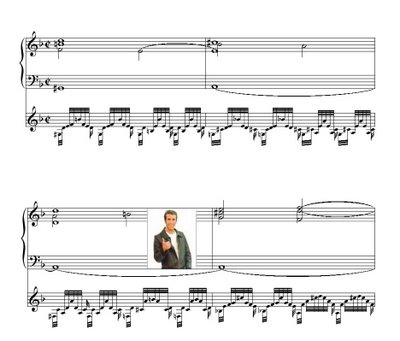For every elderly concertgoer who wrinkles his face and complains "it's so dissonant!" there's a conservatory student in his late teens at a carrel in a listening library hearing Gesualdo or Kreuzspiel for the first time, beaming, eyes wild, thinking "dude, that's f*&*()#$ awesome!" You know I'm right about this. So am I suggesting youth cherishes dissonance and age consonance? Or just bandying stereotypes? I know, for example, my parents are in their 70s (I don't know if that's considered young or old anymore) but they can be quite dissonant in the mornings, especially when my dad's making green chile and eggs and mom gets in the way of his frenetic journeys to and from stove and sink. Anyway.
Syllogism: Dissonance is cool. The Fonz is cool. Ergo: dissonance is the Fonz. He (or you can imagine a female Fonz if you like) strides in in a leather jacket; he does what he wishes; he cares not for convention; he is not fazed by conflict; he makes waves, stands out, attracts attention; he is seductive; he attracts and exists in clusters; he resists resolution, i.e. conformity, but he values his relationships; he knows where he is going, but is in no hurry; he loves to be prolonged (aeyyyyy!); he has a distinctive identity; he lives over the garage... Imagine if you must all the dissonances living in a little apartment over a garage, partying harder and harder through the 19th-century, testing their limits, until finally Schoenberg comes along and emancipates them all (the Abraham Lincoln of dissonance); suddenly with a shudder and one last mournful Tristan chord they come to realize all the fun's gone and that without limits the party's just a lame bunch of drunken dissonances above a garage, getting old and with nothing to do.
The cool "Fonzian" dissonance of the day (should this be a regular feature of Think Denk?), which prompted these "profound" reflections, comes from good old J.S. Bach BWV 1052:

Just look at that puppy! Madrigalian, searing dissonance. The F-sharp there in the bottom of the cembalo, travels down to F-natural, on its way to E-natural, just slidin' on down "innocently" (nobody here but us chickens!); meanwhile the A in one treble voice is heading up to C# and has to pass through B-natural, and there it is, the "Fonzian tritone" (I so TOTALLY invented that term, dude) that results, F-B, the ultra-hip diabolus in musica, a viscerally satisfying traffic accident of passing, colliding lines in which no one needs to get hurt but there is all the thrill of conflict and the onward rush of the incompatible. The B-natural is also wonderfully dissonant against the A pedal (the dominant pedal, that is) and the general D minor-ness of everything (music theorists, moan if you must, at this imprecise labeling, moan on and on, I'm not listening lalalala), and its searing ascent reverses a large extraordinary pattern of preceding descent, so it's also semantically dissonant, so there! These dissonances are linked, spiritually connected, to the ongoing tension of the dominant; they symbolize and represent the music's captured, caged, not-yet-allowed-to-hit-the-tonic fury. If you are at the Carnegie concert on Dec. 2, or at the other Orpheus appearances, and you recognize this moment, and you remember to think of the Fonz, please say "Aeyyy!" to yourself, quietly, in your mind. If you say it out loud, it might be distracting. Or say it to me backstage, I'll be delighted.
In a mostly unrelated note, one of my
P.S. I have never been and probably will never be a fan of the show Happy Days. I obtained the proper spelling of the Fonz's catch phrase from this indispensable website, in which the cultural milieu of my pubescent years is enumerated.
No comments:
Post a Comment